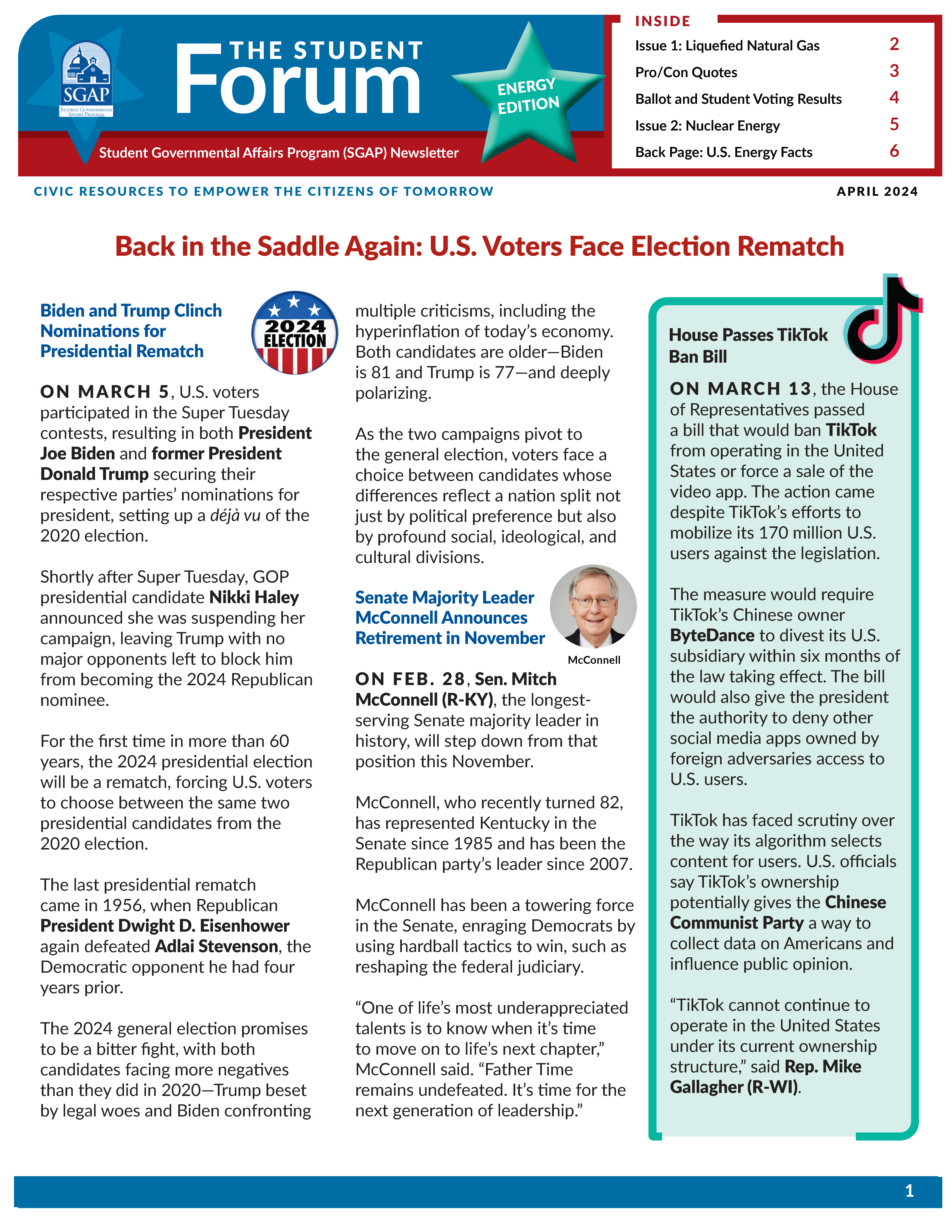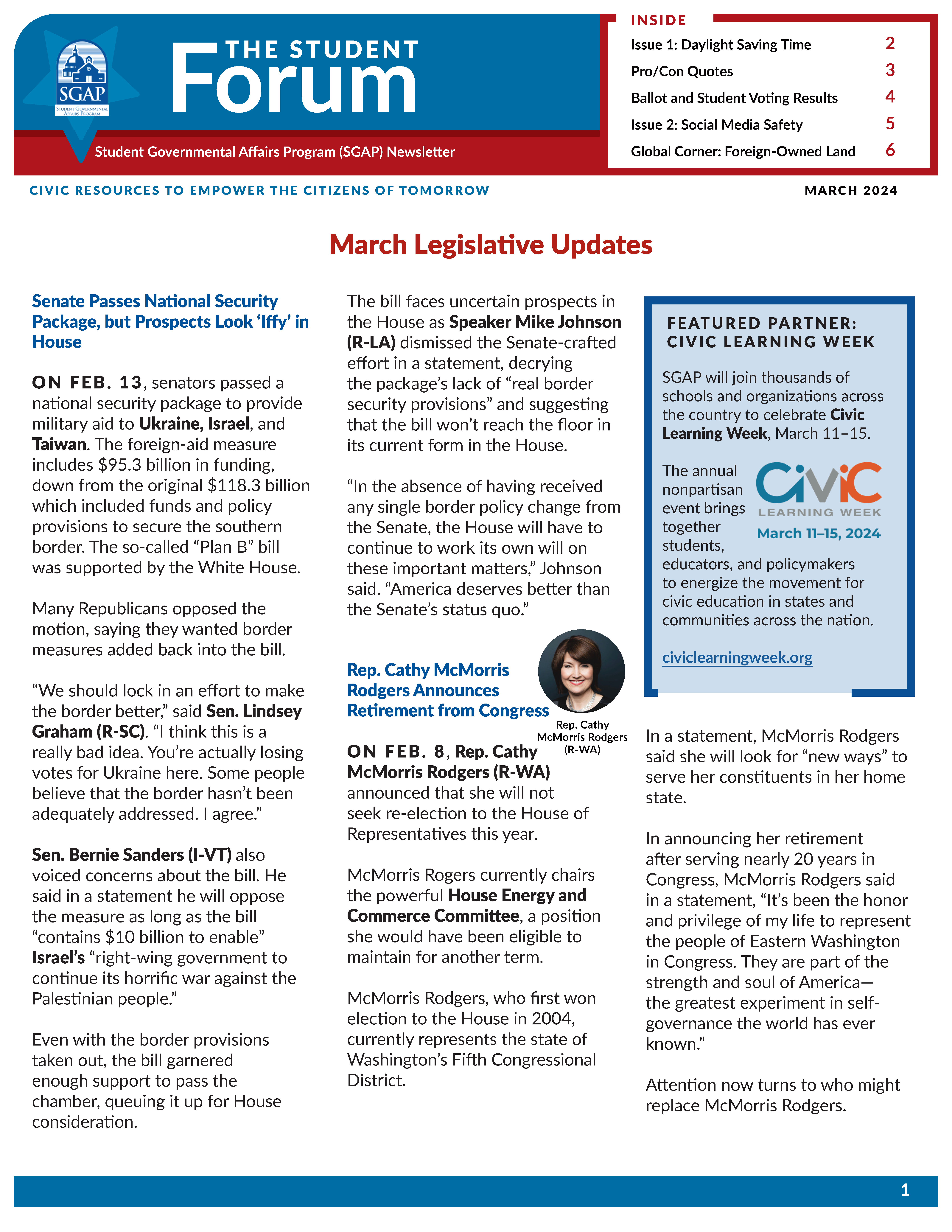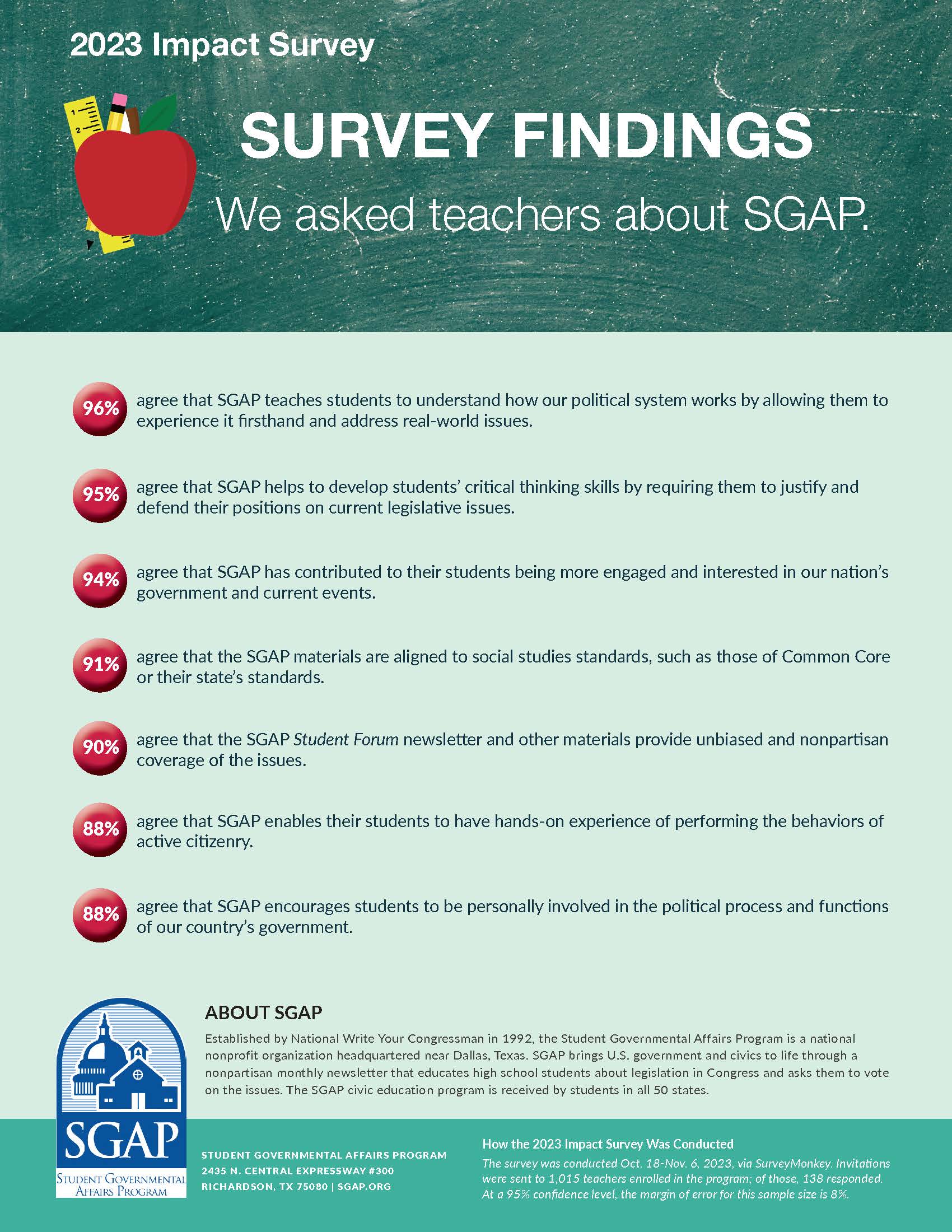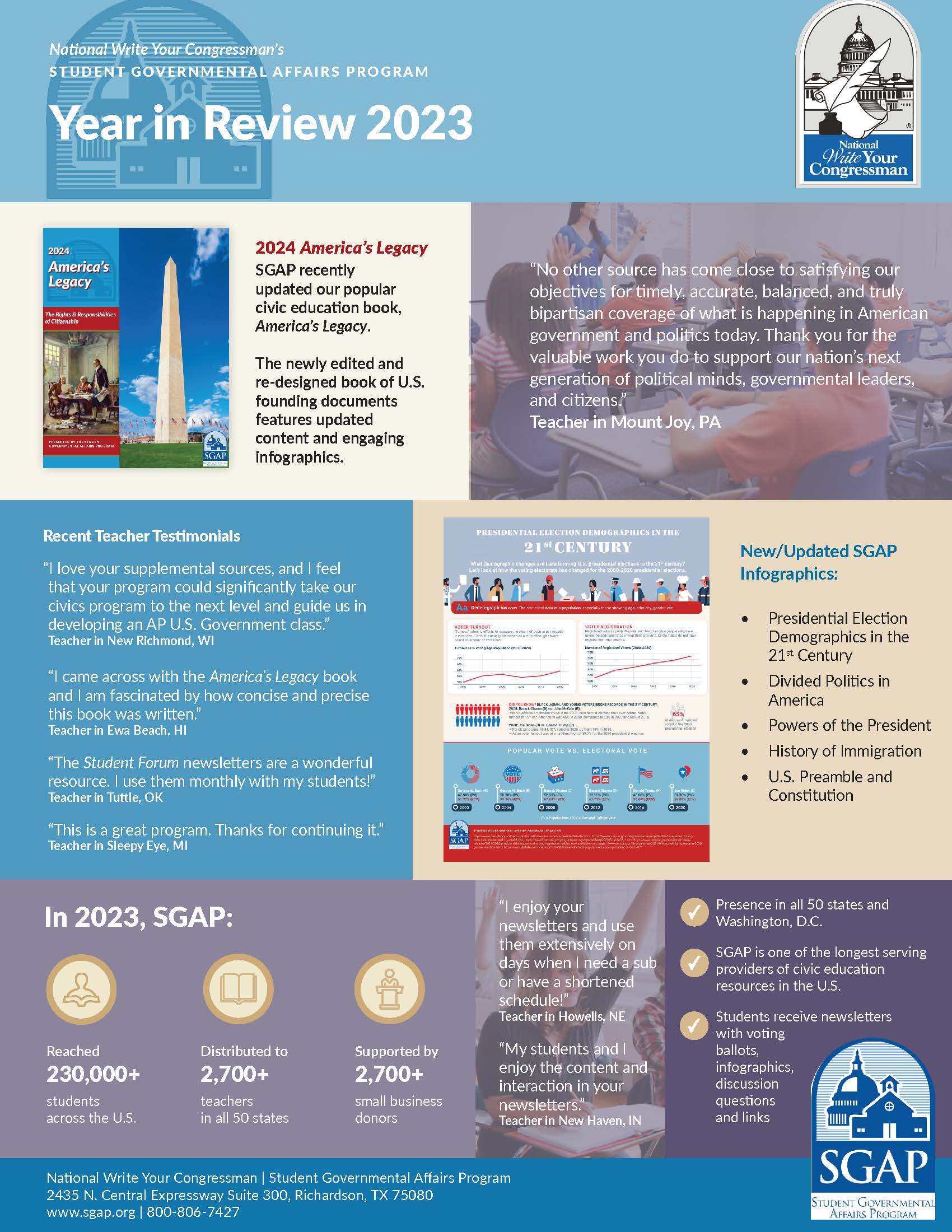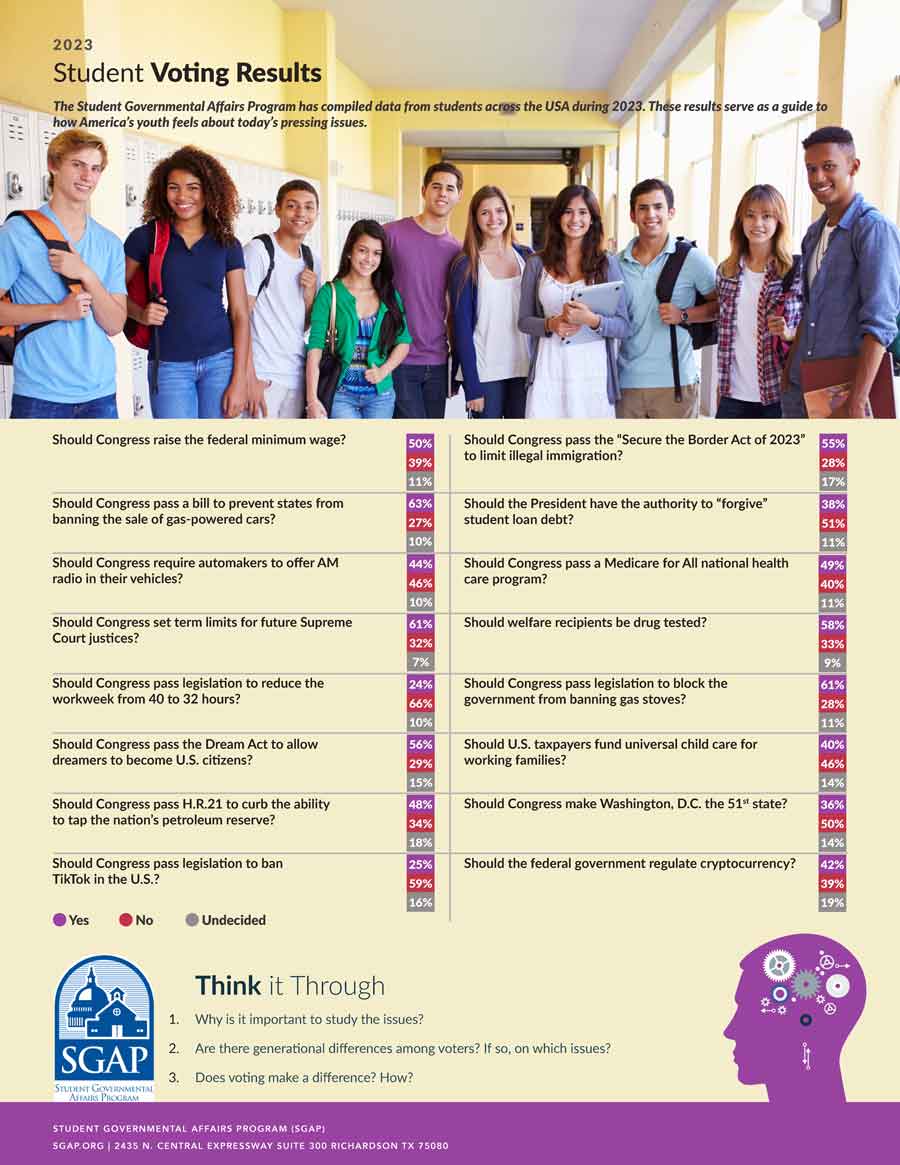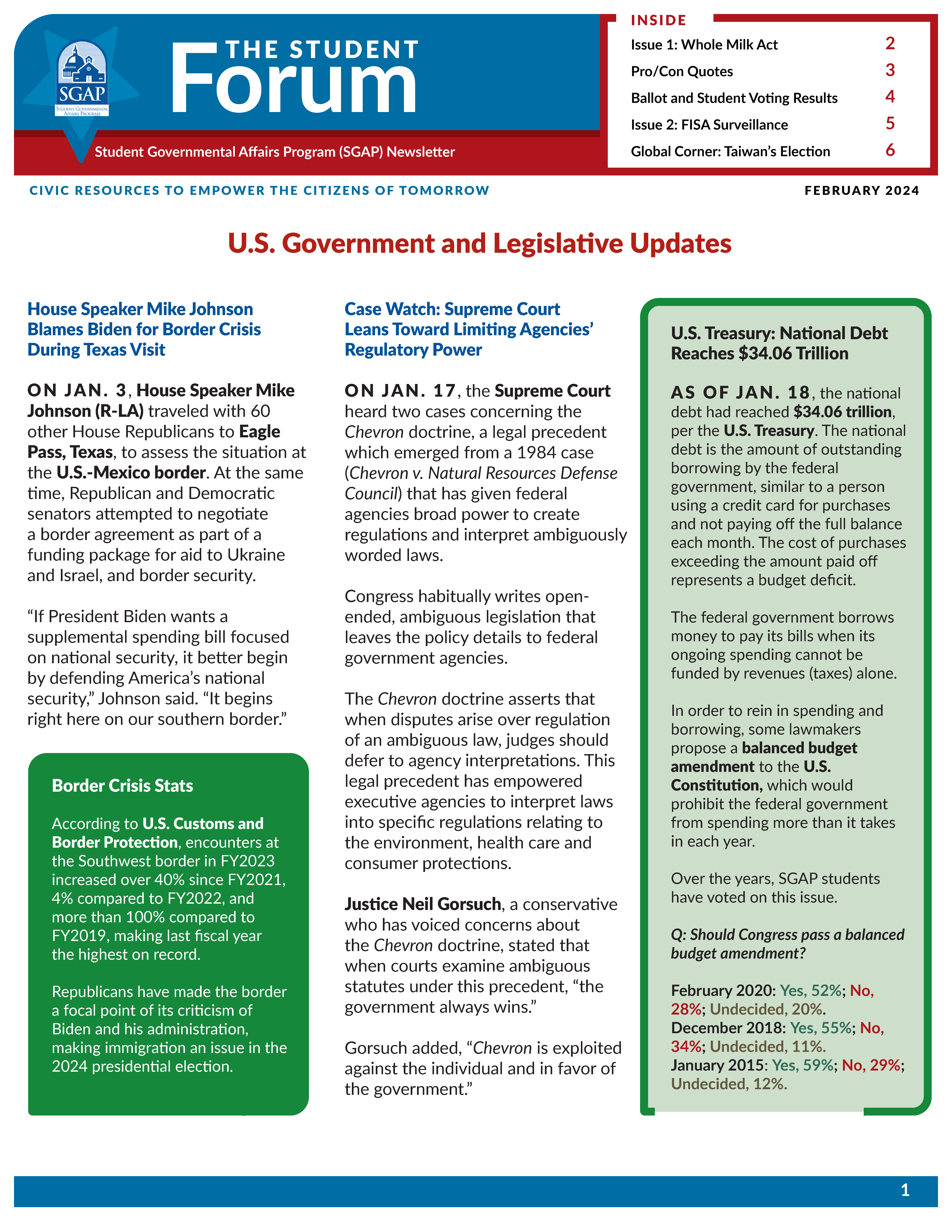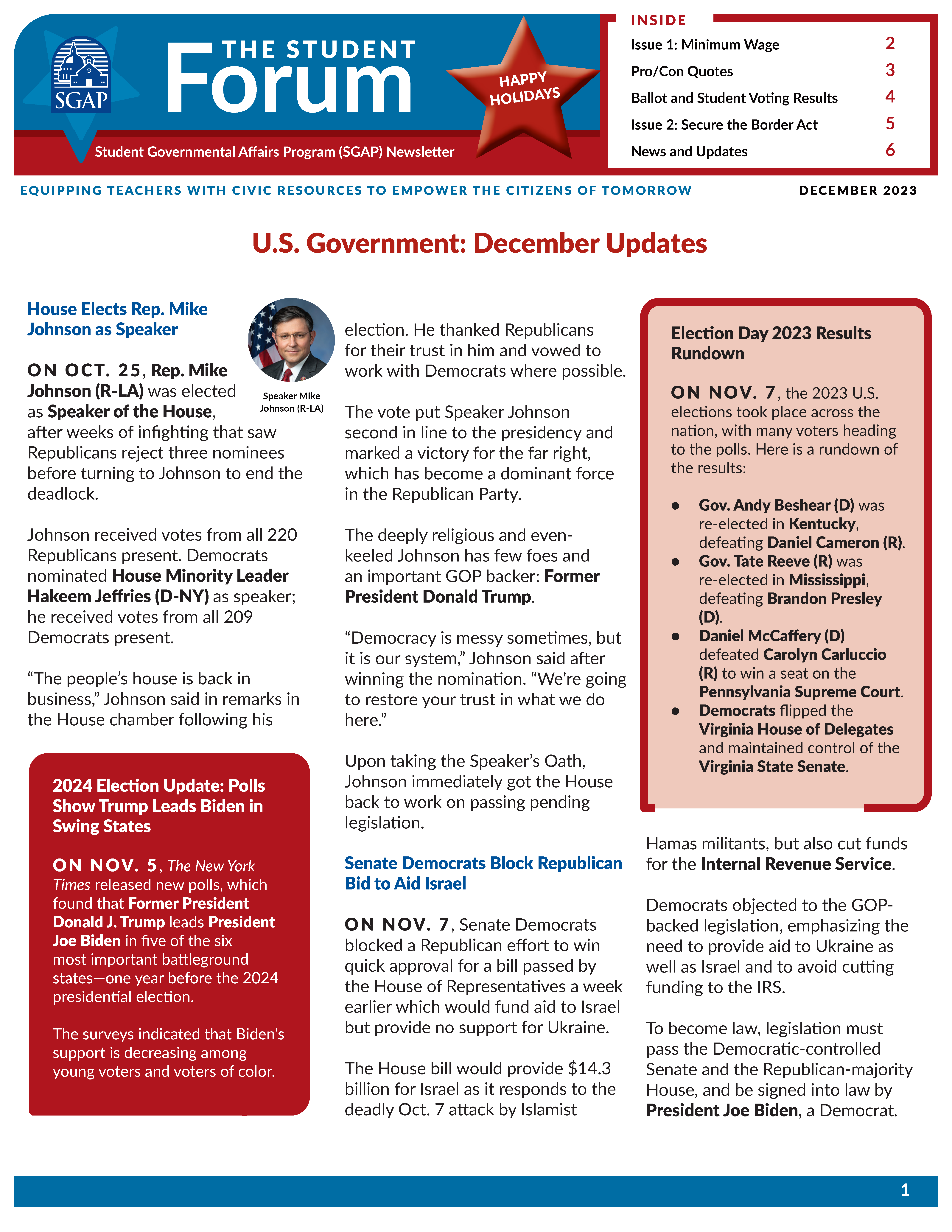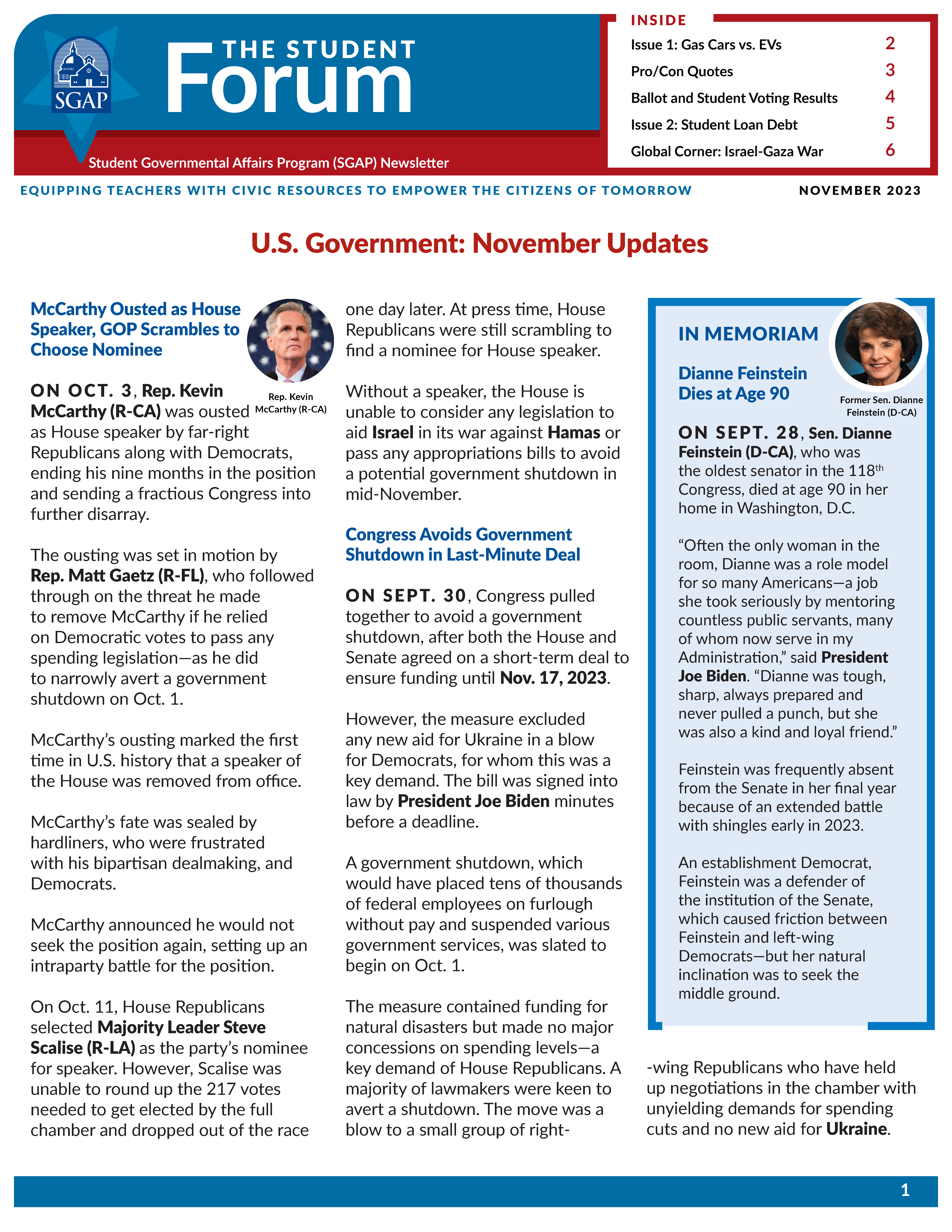Ideas for Teachers for March 2024
RESEARCH LINKS

SECTION 230 of the Communications Decency Act stipulates that “no provider or user of an interactive computer service shall be treated as the publisher or speaker of any information provided by another information content provider.”
Issue 1: Daylight Saving Time
Congress.gov: S.582 “Sunshine Protection Act of 2023”
National Conference of State Legislatures: “DST State Legislation”
Journal of Sleep Medicine: “American Academy of Sleep Medicine Statement”
NYT: “Bill to Make DST Permanent Re-emerges from the Dark”
NPR.org: “Six Things to Know about the Political Debate around DST”
Smithsonian Magazine: “What Happened Last Time U.S. Made DST Permanent?”
Issue 2: Social Media Safety
Congress.gov: S.1409 “Kids Online Safety Act”
NPR.org: “‘You Have Blood on Your Hands,’ Senator Tells Zuckerberg”
CBS News: “Meta CEO Zuckerberg Apologizes to Parents of Victims”
cdasec230: “Communications Decency Act Pros and Cons”
Electronic Frontier Foundation: “Section 230 Communications Decency Act”
WaPo: “Meta’s Zuckerberg Apologizes to Child Abuse Victims in Hearing”
DISCUSSION QUESTIONS
Issue 1: Daylight Saving Time
- Should the United States make Daylight Saving Time permanent year round? Why or why not?
- Visit https://savestandardtime.com/ and read the arguments for permanent Standard Time. What are the benefits and drawbacks of the proposal?
- How does “springing forward” and “falling back” affect you personally? Which time zone do you prefer and why?
- Why do you think some states like Hawaii and most of Arizona opt out of Daylight Saving Time?
- Compare and contrast the economic advantages and disadvantages of Daylight Saving Time with those of Standard Time. Is DST better for the economy overall? Explain your answer.
Issue 2: Social Media Safety
- In your own experience with social media, have you encountered rude or abusive behavior from others? What do you think is a good solution to this problem?
- Should the social media platform itself be responsible for the behavior and comments of users? Why or why not?
- Do you believe Section 230’s protections for big tech companies need to be revised? If so, what changes would you make?
- Do social media networks cause more harm than good? Why or why not?
- How does the Bill of Rights’ First Amendment protect free speech in the U.S.?
SGAP Newsletter for March 2024 (Social Media Safety + Daylight Saving Time)
2023 Impact Survey Results Infographic
2023 SGAP Year in Review Infographic
2023 Student Voting Results Infographic
Ideas for Teachers for February 2024
RESEARCH LINKS

THE NATIONAL SCHOOL LUNCH PROGRAM is a federally assisted meal program operating in public and nonprofit private schools. Administered by the U.S. Department of Agriculture (USDA), the program provides nutritionally balanced, low-cost, or no-cost lunches to children each school day.
Issue 1: Whole Milk
Congress.gov: H.R.1147, “Whole Milk for Healthy Kids Act of 2023”
USDA: “The National School Lunch Program Fact Sheet”
97milk.com: “Whole Milk Facts”
Physicians Committee for Responsible Medicine: “Dairy Milk Isn’t Healthy”
lancasterfarming.com: “Debate Surrounds Nutrition of Full-Fat Milk”
WSJ.com: “School Cafeterias Might Serve Whole Milk Again”
Issue 2: FISA Surveillance
Ronald Reagan Presidential Library: “Constitutional Amendment 4: Privacy”
Brennan Center for Justice: “Congress Should Not Reauthorize Surveillance”
Center for Strategic & International Studies: “Reforming Section 702 of FISA”
Americans for Prosperity: “Key Vote Alert: Vote YES on HR 6570″
WaPo Op-Ed: “FISA Provision Vital to Beating the Opioid Crisis”
Electronic Frontier Foundation: “Surveillance ‘Reform’ Bill a Farce”
DISCUSSION QUESTIONS
Issue 1: Whole Milk
- Regulations limiting milk options for schools surfaced under the Obama administration, when former First Lady Michelle Obama championed the Healthy, Hunger-Free Kids Act. Are programs like these examples of government overreach? Why or why not?
- If you had the option to buy whole or 2% milk (flavored or unflavored) for your school lunches, would you drink milk more? If so, what advantages and/or disadvantages would that bring?
- What weight should be given to the opinions of nutrition experts, parents, and even children when determining what food is served in schools?
- By limiting children’s lunch options to only fat-free or low-fat milk, is the government actually discouraging kids from drinking milk?
- If the “Whole Milk for Healthy Kids Act” is passed by Congress, can you think of any negative consequences that might occur? Would the potential negative consequences outweigh the benefits?
Issue 2: FISA Surveillance
- Does FISA Section 702 need to be amended to strengthen protections of Americans’ constitutional and privacy rights? Or should Congress permanently reauthorize it as is?
- Why do you think some legislators are concerned about the potential for abuse of power among employees and/or contractors of federal government intelligence agencies?
- Read the wording of the Fourth Amendment to the U.S. Constitution (link above). Opponents of FISA Section 702 claim that it creates a “massive end run around the Fourth Amendment’s warrant requirement.” Do you agree? Why or why not?
- Are Americans’ constitutional rights possibly being violated by some federal agencies’ current interpretations of FISA Section 702? Why or why not?
- What reforms, if any, would balance the national security value of the foreign intelligence collection program with the protection of privacy rights and civil liberties?
SGAP Newsletter for February 2024 (Whole Milk + FISA Surveillance)
Ideas for Teachers for December 2023
RESEARCH LINKS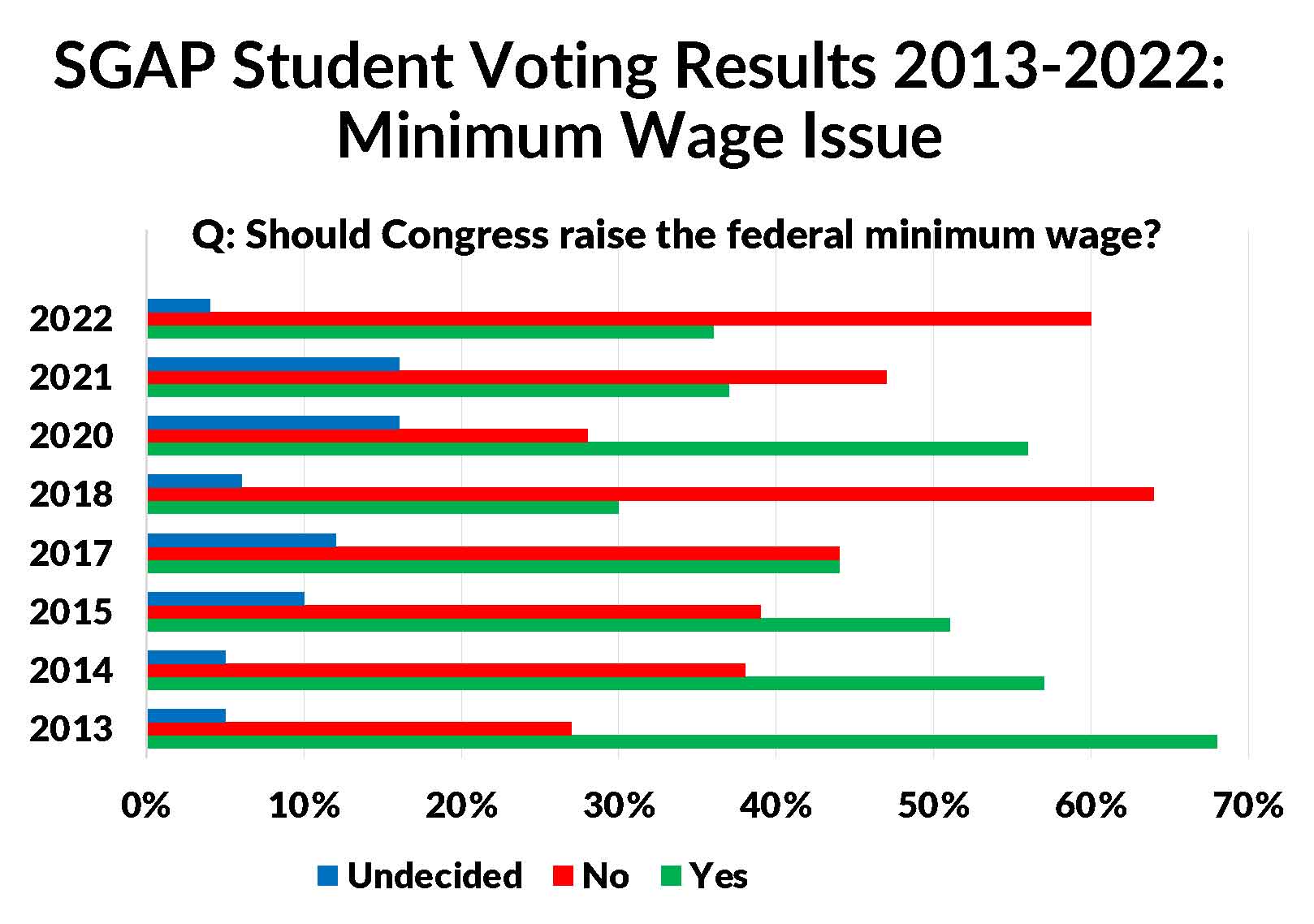
Issue 1: Minimum Wage
Congress.gov: S.2488, “Raise the Wage Act of 2023”
ProCon.org: “Should the Federal Minimum Wage Be Increased?”
U.S. Department of Labor: “History of Changes to the Minimum Wage Law”
Wharton School, University of PA: “Why Raising Minimum Wage Has Long-Term Costs”
CommonDreams.org: “Sanders, Scott Unveil $17 Federal Minimum Wage Bill”
RaisetheMinimumWage.com: “Why the U.S. Needs at least a $17 Minimum Wage”
Issue 2: Secure the Border Act
Congress.gov: S.2824, “Secure the Border Act of 2023”
U.S. Congressional Budget Office: “H.R.2, Secure the Border Act of 2023”
Senate.gov: “Cruz Introduces Senate Companion to House-Passed Secure Border Act”
WhiteHouse.gov: “Statement of Administration Policy – Secure the Border Act 2023”
WaPo OpEd, Fareed Zakaria: “Democrats Should Admit They’re Wrong on Immigration”
ImmigrationForum.org: “Bill Analysis — Secure the Border Act of 2023”
House.gov: “Congressman Mario Diaz-Balart Introduces ‘Secure the Border Act 2023’”
DISCUSSION QUESTIONS
Issue 1: Minimum Wage
- Do you support or oppose gradually raising the federal minimum wage to $17 an hour? If you were speaking to a person who disagreed with your position, what would you say to persuade them to see your side of the issue?
- Some proponents of raising the federal minimum wage say the current minimum wage of $7.25 an hour traps people in poverty. Do you agree? Why or why not?
- If you were a business owner, would you want the minimum wage to increase? Why or why not?
- What is your personal view on whether to raise the federal minimum wage? Use relevant reasons from your life experiences as well as research.
- Who bears the costs of a higher minimum wage? (Hint: In addition to businesses who have higher labor costs, this could also include workers who suffer reduced hours as well as young job seekers who find it difficult to find a job.)
Issue 2: Secure the Border Act
- Some people believe a good way to slow illegal immigration is to fine U.S. businesses who employ illegal immigrants. Do you agree? Why or why not?
- In Fareed Zakaria’s Op-Ed (link above), Zakaria states that to gain control of illegal immigration, the president should suspend admission of asylum seekers to the U.S. since asylum has become a way to game the system. Do you agree? Why or why not?
- Do you believe there is a relationship between illegal immigration and crime? Why or why not?
- What would happen if we erased all country borders and let people live wherever they wanted?
- When is immigration helpful to a country and when is it harmful?
SGAP Newsletter for December 2023 (Minimum Wage + Secure the Border Act)
Ideas for Teachers for November 2023
RESEARCH LINKS
Issue 1: Gas Cars vs. EVs
Congress.gov: H.R.1435, “Preserving Choice in Vehicle Purchases Act”
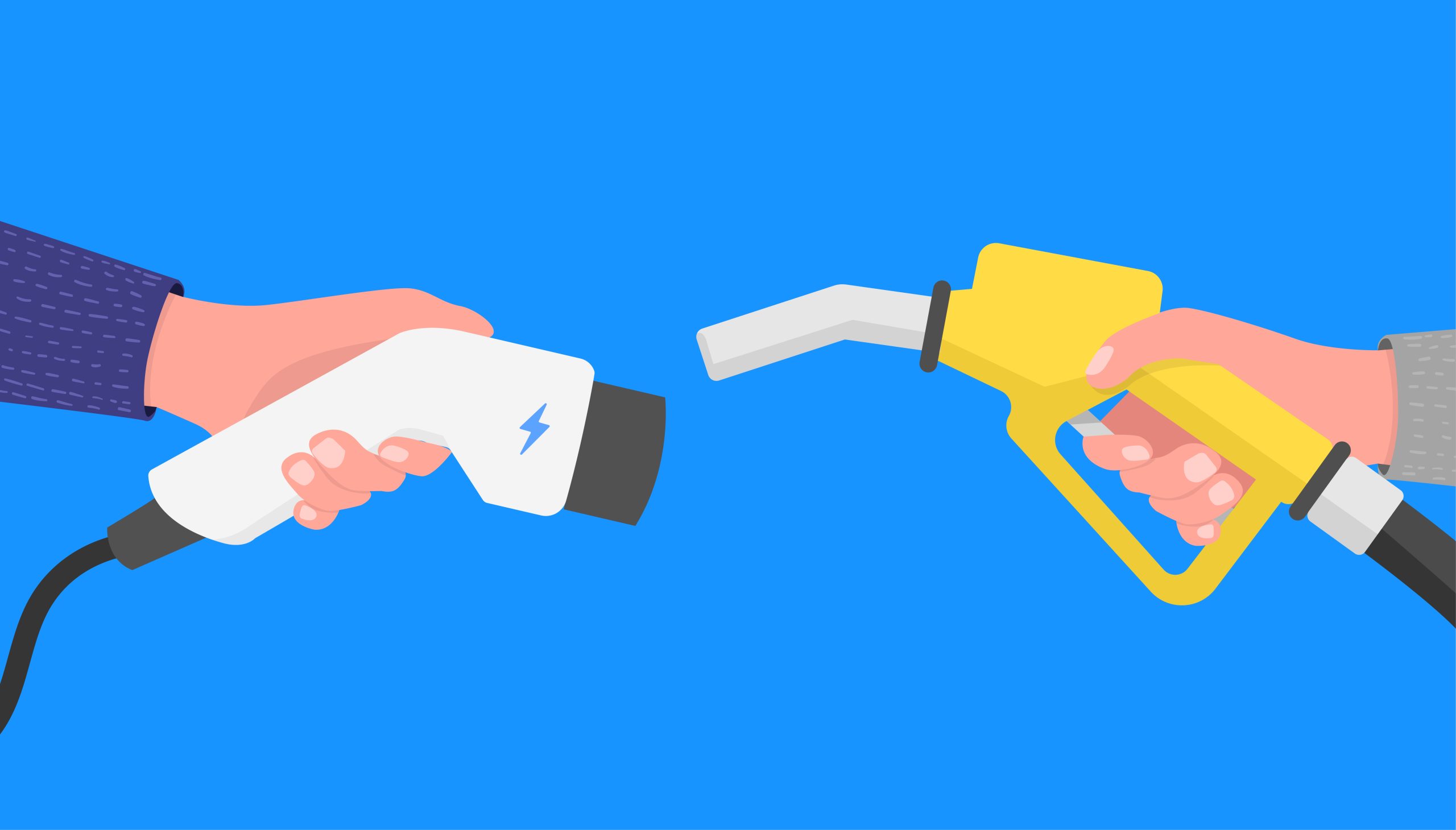
GASOLINE-POWERED CARS are familiar, quick to refuel, and can travel long distances between fill-ups, all of which can’t (yet) necessarily be said about electric vehicles or EVs. However, EVs offer a unique set of positives, from an inherently exhilarating drive feel to a significantly less harmful impact on the environment.
CarMax.com: “Electric Cars vs. Gas Cars: What’s the Difference?”
CarandDriver.com: “Electric Cars vs. Gas Cars: Everything You Need to Know”
Autoweek.com: “Electric Cars vs. Gas Cars Pros and Cons”
ConsumerReports.org: “Will an Electric Car Save You Money?”
EnergySage.com: “Electric Car vs. Gas Car Environmental Impact”
EPA.gov: “Electric Vehicle Myths”
Issue 2: Student Loan Debt
USAToday.com: “Student Loan Forgiveness, Education Department Begins”
PBS.org: “Biden’s Student Loan Cancellation Plan Advances with Debate”
ProCon.org: “Student Loan Debt Elimination – Pros and Cons”
APNews.com: “Supreme Court Rejects Biden’s Student Loan Plan”
TheAtlantic.com: “Biden’s New Student Debt Strategy”
Center for American Progress: “What’s Next for Student Loan Borrowers?”
DISCUSSION QUESTIONS
Issue 1: Gas Cars vs. EVs
- What are the arguments for and against Congress passing a bill to prevent states from banning the sale of gas-powered cars? Where do you stand on the issue?
- How important is giving American consumers the power to choose whether they will purchase a gas-powered vehicle or an electric vehicle?
- What factors might make electric cars more expensive than gas cars initially? What factors might make electric cars more affordable over time?
- Let’s compare the Tesla Model 3 (electric) to the Toyota Camry XLE (gas). Which car do you believe costs more over all (to buy and to drive) over its full lifetime? Why?
- What infrastructure and resources are required to support mass adoption of electric vehicles in the U.S.? Is the cost worth the investment? Why or why not?
Issue 2: Student Loan Debt
1. Supporters of the Biden administration’s efforts to forgive student loan debt say it would deliver relief to debt-burdened households and lift the economy. Opponents, however, say it’s unfair to those who avoided debt or made sacrifices so they could repay their loans. Where do you stand on the issue? Explain your position.
2. Does student debt affect you or someone you know, and if so, how? What went into the decision to take on student debt? How do you (or they) feel about the decision now?
3. Would forgiving all or part of people’s student loan debt help narrow the racial wealth gap? Why or why not?
4. Some people think student loan debt should be “forgiven” and college tuition should be paid for by the government. Who would actually pay those costs?
5. Should people who chose not to attend college be forced to pay for others’ college education? Why or why not?


